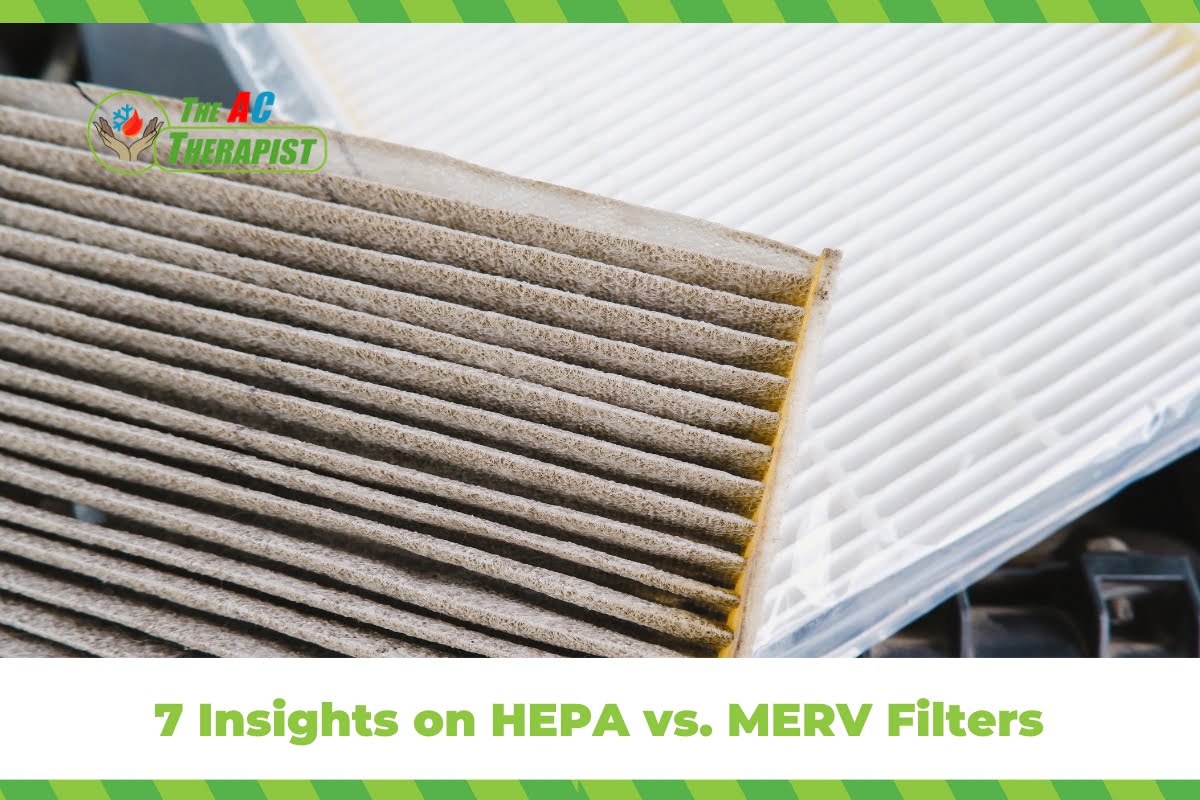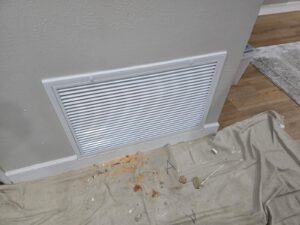7 Insights on HEPA vs. MERV Filters
Indoor air quality is a critical aspect of our daily lives, affecting not only our comfort but also our health. In recent years, increasing attention has been given to the quality of the air we breathe indoors, where we spend a significant portion of our time. Poor indoor air quality can lead to a range of health issues, from minor irritations like headaches and fatigue to more severe conditions such as respiratory diseases, allergies, and even long-term effects on the cardiovascular system. Given these potential health impacts, ensuring the air within our homes is clean and free from pollutants is essential.
One effective solution to improve indoor air quality is the use of air filters within HVAC (Heating, Ventilation, and Air Conditioning) systems. Air filters are designed to trap and remove particles and pollutants from the air, including dust, pollen, mold spores, bacteria, and viruses. Among the various types of air filters available on the market, High-Efficiency Particulate Air (HEPA) filters and Minimum Efficiency Reporting Value (MERV) filters are two of the most notable.
HEPA filters are renowned for capturing 99.97% of particles as small as 0.3 microns, making them incredibly efficient at purifying the air of fine particles. On the other hand, MERV filters are rated on a scale from 1 to 20, with higher numbers indicating a greater ability to filter out smaller particles. These filters offer a range of options for homeowners, depending on their specific air quality needs and system compatibility.
Understanding Air Filters
Understanding the nuances of air filters is essential for homeowners seeking to improve the air quality within their homes. Two prominent types of air filters that play a critical role in purifying indoor air are High-Efficiency Particulate Air (HEPA) filters and Minimum Efficiency Reporting Value (MERV) filters. Both types have unique characteristics and efficiencies, making them suitable for different environments and needs.
HEPA Filters
HEPA filters represent the gold standard in air filtration technology. To qualify as HEPA, a filter must meet a specific efficiency standard: it must be capable of capturing at least 99.97% of airborne particles as small as 0.3 microns in diameter. This includes a wide range of pollutants such as dust mites, pollen, mold spores, pet dander, and even certain bacteria and viruses. The efficiency of HEPA filters is due to their dense, multi-layered mesh of fibers, typically made from fiberglass. The mesh is designed to trap particles through various mechanisms, including interception, impaction, and diffusion.
The high efficiency of HEPA filters makes them particularly suitable for environments where air purity is paramount, such as hospitals, laboratories, and homes where residents suffer from allergies or respiratory conditions. However, their fine filtration capability can also lead to increased resistance to airflow, which may require adjustments to HVAC systems to accommodate the added strain.
MERV Filters
The Minimum Efficiency Reporting Value (MERV) rating system is used to classify the filtering efficiency of air filters based on the size of particles they can capture. MERV ratings range from 1 to 20, with higher numbers indicating a filter’s ability to capture smaller particles. For instance, filters with MERV ratings between 1 and 4 are typically used to capture large particles such as dust and lint, while those rated between 13 and 16 are capable of capturing bacteria, tobacco smoke, and even some viruses, making them comparable to the efficiency of HEPA filters in certain aspects.
MERV filters are versatile, catering to a broad spectrum of filtration needs from residential to commercial and industrial settings. Lower-rated MERV filters are more commonly used in residential HVAC systems due to their minimal impact on airflow and energy efficiency. Higher-rated MERV filters, on the other hand, are often found in settings that require stricter air quality control, such as hospitals and cleanrooms.
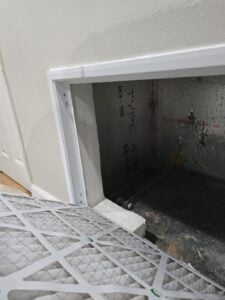
Understanding the Differences
The key differences between HEPA and MERV filters lie in their filtration efficiency and suitability for various applications. HEPA filters are unmatched in their ability to purify air to a very high degree, making them ideal for those with severe allergies or in settings where air quality is critical. MERV filters, with their wide range of ratings, offer more flexibility in balancing air quality needs with system efficiency and cost considerations.
When choosing between HEPA and MERV filters, homeowners must consider factors such as the specific air quality needs of their household, the compatibility of these filters with their existing HVAC systems, and the overall impact on energy consumption and maintenance requirements. Understanding these factors will enable homeowners to select the most appropriate air filtration solution, ensuring a healthier indoor environment.
Benefits
Both High Efficiency Particulate Air (HEPA) filters and Minimum Efficiency Reporting Value (MERV) filters offer distinct benefits in improving indoor air quality. While HEPA filters are known for their superior filtration efficiency, MERV filters provide flexibility and compatibility with a wide range of HVAC systems. Here, we’ll explore the benefits of both HEPA and MERV filters to understand how they can contribute to a healthier indoor environment.
Benefits of HEPA Filters
- Exceptional Filtration Efficiency: HEPA filters are designed to capture at least 99.97% of airborne particles as small as 0.3 microns, making them extremely effective at filtering out allergens, pathogens, and pollutants. This level of efficiency is particularly beneficial for individuals with allergies, asthma, or other respiratory conditions, as it significantly reduces exposure to airborne triggers.
- Improved Air Quality in Sensitive Environments: The high efficiency of HEPA filters makes them the preferred choice in healthcare settings, laboratories, and any environment where air purity is critical. They are effective in trapping bacteria, viruses, and fine particulates, ensuring a cleaner and safer air supply.
- Long-term Health Benefits: Regular use of HEPA filters can contribute to long-term health benefits by consistently removing harmful airborne particles. This reduces the risk of chronic respiratory diseases and other conditions related to air quality.
- Support for Allergy and Asthma Sufferers: HEPA filters can dramatically improve living conditions for people with allergies or asthma by efficiently removing common allergens like pollen, pet dander, and dust mites from the air.
Benefits of MERV Filters
- Versatility and Range: MERV filters come in a variety of ratings (1-20), allowing homeowners and facility managers to choose the appropriate level of filtration based on their specific needs and the capabilities of their HVAC systems. This flexibility ensures that there’s a suitable MERV filter for almost any situation, from residential to commercial settings.
- Balanced Filtration and Airflow: Lower-rated MERV filters (e.g., MERV 1-8) provide adequate filtration for common household dust and debris while maintaining optimal airflow in HVAC systems. This balance is crucial for energy efficiency and preventing strain on HVAC components.
- Cost-Effectiveness: MERV filters generally offer a cost-effective solution for air filtration. They are available at a range of prices that accommodate different budgets, with the added benefit of being widely compatible with standard HVAC systems without requiring modifications.
- Improved Indoor Air Quality: By selecting a MERV filter with an appropriate rating, it’s possible to significantly improve indoor air quality by reducing pollutants, allergens, and other airborne particles. This contributes to a healthier indoor environment and can alleviate symptoms of allergy and asthma sufferers.
- Energy Efficiency: Higher-rated MERV filters (e.g., MERV 13-16) that are compatible with residential systems can provide a level of air cleaning similar to HEPA filters for certain particles, without significantly impacting energy consumption if the HVAC system is designed to handle them.
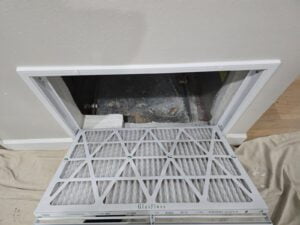
Comparing HEPA and MERV Filters
When considering air filtration options for your home, understanding the differences between High-Efficiency Particulate Air (HEPA) filters and Minimum Efficiency Reporting Value (MERV) filters is crucial. Here are seven insights to help you navigate the choice between HEPA and MERV filters, ensuring you select the best option for your specific needs:
1. Filtration Efficiency:
- HEPA filters are designed to remove at least 99.97% of airborne particles as small as 0.3 microns, making them extremely effective at capturing fine particulates like pollen, mold spores, and certain viruses.
- MERV filters are rated on a scale from 1 to 20, with higher MERV ratings indicating better filtration capabilities. Filters with a MERV rating of 13 or higher can capture smaller particles, including bacteria and virus carriers, but may not reach the efficiency of HEPA filters for the smallest particulates.
2. Application Suitability:
- HEPA filters are often used in medical facilities, research labs, and homes where air purity is critical due to health concerns like allergies or respiratory conditions.
- MERV filters are versatile, and used in residential, commercial, and industrial settings, with the specific MERV rating selected based on the desired level of air quality and system compatibility.
3. System Compatibility and Installation:
- Installing HEPA filters may require modifications to residential HVAC systems due to their dense structure, which can restrict airflow and strain the system.
- MERV filters are designed to fit standard HVAC systems without significant modifications, offering a range of options that can accommodate different airflow and efficiency needs.
4. Cost Considerations:
- HEPA filters typically have higher initial costs and maintenance expenses due to their sophisticated design and higher filtration efficiency.
- MERV filters offer a cost-effective solution for improving air quality, with a wide range of prices based on the rating and specific needs.
5. Energy Efficiency:
- The dense structure of HEPA filters can lead to increased energy consumption as HVAC systems work harder to push air through.
- Lower to mid-range MERV filters can improve air quality without significantly impacting energy efficiency, though higher-rated MERV filters may also increase energy use.
6. Health Benefits:
- HEPA filters are particularly beneficial for individuals with severe allergies, asthma, or other respiratory conditions, offering a higher level of protection against airborne allergens and pathogens.
- MERV filters with higher ratings (e.g., 11-13) can also significantly reduce allergens and improve indoor air quality, though they may not be as effective as HEPA filters for the finest particulates.
7. Longevity and Maintenance:
- HEPA filters often require more frequent replacements compared to MERV filters, depending on usage and environmental factors.
- MERV filters need regular changes as well, but the frequency can vary widely based on the specific rating and environmental conditions, with some options offering longer service intervals.
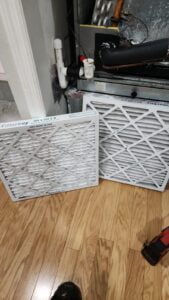
Making the Right Choice for Your Home
Selecting the right air filter for your home involves balancing several factors to ensure you meet your indoor air quality needs without compromising your HVAC system’s efficiency or incurring unnecessary costs. Whether you’re considering HEPA or MERV filters, the decision should be based on a comprehensive assessment of your specific situation. Here are some steps and considerations to help you make the right choice for your home:
Assessing Your Needs
- Allergies and Respiratory Conditions: If someone in your household suffers from severe allergies, asthma, or other respiratory conditions, a HEPA filter may be the best choice due to its superior ability to remove fine particulates from the air. However, ensure your HVAC system can accommodate a HEPA filter without significant modifications.
- General Air Quality Concerns: For general air quality improvements, such as reducing dust or pet dander, a MERV filter with a rating between 8 and 13 might be sufficient. These filters can effectively capture most large and medium-sized particles without overly straining your HVAC system.
- Local Air Pollution Levels: Consider the external air quality in your area. Homes in areas with high levels of pollution or seasonal wildfires may benefit from higher-rated MERV filters or even HEPA filters to ensure clean indoor air.
Compatibility with Existing HVAC Systems
- Airflow and System Strain: High-efficiency filters like HEPA and high-rated MERV filters can restrict airflow, potentially straining the HVAC system. Before upgrading, check with a professional to ensure your system can handle the filter without reducing efficiency or causing damage.
- Size and Fit: Ensure the filter you choose is available in the size you need for your HVAC system. An improper fit can lead to air bypassing the filter, reducing its effectiveness.
Cost Considerations
- Initial Investment vs. Long-term Savings: Higher efficiency filters typically cost more upfront and may require more frequent replacements. However, they can lead to long-term health benefits and savings by reducing potential medical expenses related to poor air quality.
- Energy Consumption: Consider the impact of the filter on your energy bills. Higher resistance filters can lead to increased energy consumption. Balancing filtration needs with energy efficiency is crucial.
Recommendations for Different Scenarios
- Homes with Pets: A MERV rating of 8-11 is usually sufficient to capture pet dander and hair, improving air quality for most homeowners.
- Allergy Sufferers: Consider a MERV rating of 11-13 or a HEPA filter, depending on the severity of the allergies and system compatibility.
- High Pollution Areas: Higher-rated MERV filters (13-16) or HEPA filters can provide significant benefits in areas with high levels of outdoor pollution.
Finding the Perfect Air Filter for Your Sanctuary: Navigating HEPA vs. MERV with The AC Therapist
As we conclude our comprehensive exploration into the dynamic world of HEPA and MERV air filters, it’s my hope that this guide has illuminated the path toward achieving superior indoor air quality in your home. At The AC Therapist, our commitment goes beyond mere service; we aspire to be your trusted advisors in creating living environments that not only comfort but also nurture health and well-being. Deciphering whether the unparalleled filtration capabilities of HEPA filters or the adaptable, economic advantages of MERV filters best suit your home is a crucial decision—one that resonates with your commitment to providing the safest, most comfortable space for your loved ones.
In my tenure as The AC Therapist, I’ve had the privilege of addressing a diverse array of indoor air quality challenges. Each experience has reinforced the critical role that a carefully chosen air filter plays in enhancing a home’s health. From combating allergens and pollutants to ensuring that the air circulating through your space is of the highest purity, the impact of the right filter cannot be overstated. It’s about more than just air quality; it’s about creating a sanctuary where every aspect of your environment supports well-being.
If the choice between HEPA and MERV filters leaves you with questions, remember, you’re not alone in this decision. The AC Therapist team is here to guide you, offering our expertise to navigate the nuances of air filtration. We’re dedicated to ensuring your HVAC system not only meets but exceeds your expectations for air quality. By providing tailored recommendations, precision installation, and meticulous maintenance, we empower your system to deliver the cleanest air possible, efficiently and reliably.
Embarking on the journey to select the perfect air filter is a significant step toward cultivating a healthier, more enjoyable living environment. It’s an investment in your home’s future and the well-being of those who inhabit it. As your partners in this endeavor, The AC Therapist is committed to standing by your side, offering our knowledge and support to make this process as seamless and successful as possible. With our guidance, you can transform your home into a haven of clean air—a place where health and happiness flourish.
Let this be the beginning of a renewed focus on indoor air quality in your home, guided by the insights and expertise of The AC Therapist. Together, we’ll navigate the complexities of air filtration, ensuring your living space is equipped with the best solution to meet your unique needs. By choosing the right HEPA or MERV filter, you’re not just enhancing your air quality; you’re taking a proactive step towards a healthier, more vibrant home life.
Join us in this mission, and let’s create a sanctuary where every breath is a testament to the care and thoughtfulness you’ve invested in your home. With The AC Therapist, breathe easier knowing we’re here to help every step of the way, ensuring your home’s air is as pure and refreshing as it can be.

